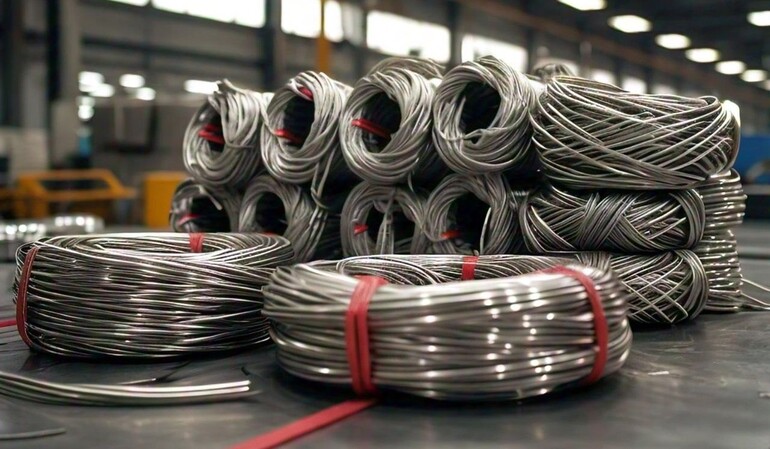- No.3, 327 S.V.P.Road, Makharai House, Mumbai- 400004, INDIA
- sales@ariesalloys.com
Titanium Wires Blog
- Home
- Titanium Wires Blog

Titanium Wire: Types, Benefits, and a Story of Engineering Triumph
Titanium is one of the most sought-after metals in modern engineering due to its exceptional strength, corrosion resistance, and lightweight properties. Among its many applications, titanium wire plays a crucial role in industries such as aerospace, marine, chemical processing, and medical devices. In this blog, we will explore the different types of titanium wire, their benefits, and conclude with an inspiring real-world story that highlights their importance.
Types of Titanium Wire
Titanium wire comes in various grades and compositions, each designed for specific applications. Below are the most common types:
1. Commercially Pure (CP) Titanium Wire
These wires, available in Grades 1 through 4, are used in industries requiring high corrosion resistance, such as chemical processing, marine, and medical applications.
2. Titanium Alloy Wire
Alloyed wires such as Ti-6Al-4V (Grade 5) provide superior strength and heat resistance, making them ideal for aerospace, automotive, and military applications.
3. Welding Titanium Wire
These wires are specifically designed for welding applications, ensuring strong, high-quality welds in aerospace, marine, and industrial manufacturing.
4. Spring Titanium Wire
This type of wire is used in high-performance springs and fasteners that require excellent durability, strength, and resistance to extreme conditions.
5. Medical Titanium Wire
Used for surgical implants, orthodontic braces, and medical instruments, this wire is biocompatible and highly resistant to corrosion.
Benefits of Titanium Wire
Titanium wire offers several advantages over traditional materials like steel or aluminum:
- Corrosion Resistance: Titanium wire is highly resistant to corrosion from seawater, chemicals, and harsh environments, making it perfect for marine and chemical processing industries.
- High Strength-to-Weight Ratio: Titanium is as strong as steel but about 45% lighter, providing significant weight savings in aerospace and industrial applications.
- Superior Flexibility: Titanium wire is highly flexible and can be easily shaped for various applications without losing strength.
- Biocompatibility: Due to its non-toxic and non-reactive nature, titanium wire is widely used in medical implants and surgical instruments.
- High-Temperature Resistance: It maintains its strength even at high temperatures, making it suitable for power generation and aerospace applications.
A Story of Engineering Triumph: How Titanium Wire Revolutionized Orthodontics
In 2023, an orthodontics company was facing challenges with traditional stainless steel braces, which often caused discomfort and allergic reactions. The company decided to replace steel wires with titanium wire to improve patient comfort and treatment effectiveness.
The results were groundbreaking. Titanium wires provided superior flexibility, allowing for gentler, more effective tooth movement while reducing discomfort. Patients reported shorter treatment times and fewer complications. Additionally, the corrosion resistance of titanium wires eliminated the risk of metal degradation inside the mouth.
This success story showcases how investing in high-quality titanium wire can significantly enhance the performance and longevity of critical applications in medical and industrial fields.
Conclusion
Titanium wire is an excellent choice for industries that require durability, corrosion resistance, and lightweight properties. Whether you’re in aerospace, marine, or medical manufacturing, using the right type of titanium wire can enhance efficiency and reduce long-term costs. The story of titanium wire in orthodontics is just one example of how this exceptional material continues to revolutionize engineering and industrial applications worldwide.
In 2023, an orthodontics company was facing challenges with traditional stainless steel braces, which often caused discomfort and allergic reactions. The company decided to replace steel wires with titanium wire to improve patient comfort and treatment effectiveness.
The results were groundbreaking. Titanium wires provided superior flexibility, allowing for gentler, more effective tooth movement while reducing discomfort. Patients reported shorter treatment times and fewer complications. Additionally, the corrosion resistance of titanium wires eliminated the risk of metal degradation inside the mouth.
This success story showcases how investing in high-quality titanium wire can significantly enhance the performance and longevity of critical applications in medical and industrial fields.
Conclusion
Titanium wire is an excellent choice for industries that require durability, corrosion resistance, and lightweight properties. Whether you’re in aerospace, marine, or medical manufacturing, using the right type of titanium wire can enhance efficiency and reduce long-term costs. The story of titanium wire in orthodontics is just one example of how this exceptional material continues to revolutionize engineering and industrial applications worldwide.
Titanium wire is an excellent choice for industries that require durability, corrosion resistance, and lightweight properties. Whether you’re in aerospace, marine, or medical manufacturing, using the right type of titanium wire can enhance efficiency and reduce long-term costs. The story of titanium wire in orthodontics is just one example of how this exceptional material continues to revolutionize engineering and industrial applications worldwide.
